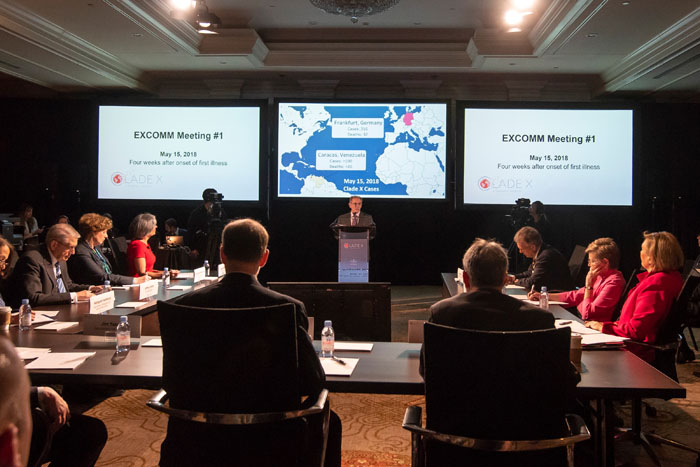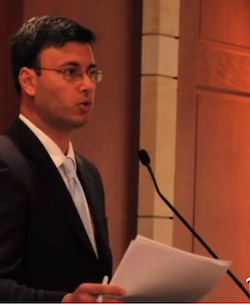 In February 2022 the Sequoia Project released its Emergency Preparedness Information Workgroup’s Pandemic Response Insights and Recommendations. This workgroup was convened in the fall of 2020 at the height of the pandemic with a diverse set of stakeholders from all areas of the healthcare system. The resulting short report is worth a read as it offers concise analysis and recommendations. The first task the workgroup undertook was to conduct a SWOT (strengths, weaknesses, opportunities, threats) analysis focused on pandemic response. There was a strong public health focus that resulted from this activity: “During a declared emergency, and during non-emergency times as well, public health should be viewed as a collaborator and partner with equal access to shared data” (p. 6).
In February 2022 the Sequoia Project released its Emergency Preparedness Information Workgroup’s Pandemic Response Insights and Recommendations. This workgroup was convened in the fall of 2020 at the height of the pandemic with a diverse set of stakeholders from all areas of the healthcare system. The resulting short report is worth a read as it offers concise analysis and recommendations. The first task the workgroup undertook was to conduct a SWOT (strengths, weaknesses, opportunities, threats) analysis focused on pandemic response. There was a strong public health focus that resulted from this activity: “During a declared emergency, and during non-emergency times as well, public health should be viewed as a collaborator and partner with equal access to shared data” (p. 6).
pandemic preparedness
See the following -
Clade X pandemic exercise highlights policies needed to prevent or reduce the worst possible outcomes in future pandemics
 The outbreak of a moderately contagious and moderately lethal novel pathogen precipitated a catastrophic end to the scenario in Clade X, the day-long pandemic tabletop exercise hosted by the Johns Hopkins Center for Health Security on May 15 in Washington, DC. Clade X simulated a series of National Security Council–convened meetings of 10 US government leaders, played by individuals prominent in the fields of national security or epidemic response. Their dialogue as the scenario unfolded addressed significant uncertainties in current prevention and response capabilities, hamstrung by policy challenges at the federal level.
The outbreak of a moderately contagious and moderately lethal novel pathogen precipitated a catastrophic end to the scenario in Clade X, the day-long pandemic tabletop exercise hosted by the Johns Hopkins Center for Health Security on May 15 in Washington, DC. Clade X simulated a series of National Security Council–convened meetings of 10 US government leaders, played by individuals prominent in the fields of national security or epidemic response. Their dialogue as the scenario unfolded addressed significant uncertainties in current prevention and response capabilities, hamstrung by policy challenges at the federal level.
- Login to post comments
The Sequoia Project Releases a Useful Workgroup Report on Information and Pandemic Response
- Login to post comments
The World Knows an Apocalyptic Pandemic Is Coming
 A new independent report compiled at the request of the United Nations secretary-general warns that there is a "very real threat" of a pandemic sweeping the planet, killing up to 80 million people. A deadly pathogen, spread airborne around the world, the report says, could wipe out almost 5 percent of the global economy. And we're not ready. The ominous analysis was compiled by an independent panel, the Global Preparedness Monitoring Board (GPMB), which was assembled last year in response to a request from the office of the U.N. secretary-general, and convened jointly by the World Bank and World Health Organization (WHO). Co-chaired by the former WHO head and former Norwegian Prime Minister Gro Harlem Brundtland and the head of the international Red Cross, Elhadj As Sy, the GPMB commissioned expert studies and issued a scathing attack on the political, financial, and logistical state of pandemic preparedness affairs.
A new independent report compiled at the request of the United Nations secretary-general warns that there is a "very real threat" of a pandemic sweeping the planet, killing up to 80 million people. A deadly pathogen, spread airborne around the world, the report says, could wipe out almost 5 percent of the global economy. And we're not ready. The ominous analysis was compiled by an independent panel, the Global Preparedness Monitoring Board (GPMB), which was assembled last year in response to a request from the office of the U.N. secretary-general, and convened jointly by the World Bank and World Health Organization (WHO). Co-chaired by the former WHO head and former Norwegian Prime Minister Gro Harlem Brundtland and the head of the international Red Cross, Elhadj As Sy, the GPMB commissioned expert studies and issued a scathing attack on the political, financial, and logistical state of pandemic preparedness affairs.
- Login to post comments
This mock pandemic killed 150 million people. Next time it might not be a drill
 A novel virus, moderately contagious and moderately lethal, has surfaced and is spreading rapidly around the globe. Outbreaks first appear in Frankfurt, Germany, and Caracas, Venezuela. The virus is transmitted person-to-person, primarily by coughing. There are no effective antivirals or vaccines...So began a recent day-long exercise hosted by the Johns Hopkins Center for Health Security. The simulation mixed details of past disasters with fictional elements to force government officials and experts to make the kinds of key decisions they could face in a real pandemic. It was a tense day. The exercise was inspired in part by the troubled response to the Ebola epidemic of 2014, and everyone involved was acutely aware of the very real and ongoing Ebola outbreak spreading in Congo.
A novel virus, moderately contagious and moderately lethal, has surfaced and is spreading rapidly around the globe. Outbreaks first appear in Frankfurt, Germany, and Caracas, Venezuela. The virus is transmitted person-to-person, primarily by coughing. There are no effective antivirals or vaccines...So began a recent day-long exercise hosted by the Johns Hopkins Center for Health Security. The simulation mixed details of past disasters with fictional elements to force government officials and experts to make the kinds of key decisions they could face in a real pandemic. It was a tense day. The exercise was inspired in part by the troubled response to the Ebola epidemic of 2014, and everyone involved was acutely aware of the very real and ongoing Ebola outbreak spreading in Congo.
- Login to post comments
Three Reasons the US is Not Ready for the Next Pandemic
 One hundred years after the Great Influenza pandemic of 1918, global health leadership stands at a crossroads. The United States continues to expand its policy of isolationism at a time when international cooperation in health could not be more important. The state of pandemic preparedness and the necessary steps for protecting the people throughout the world was the topic of The Scowcroft Institute for International Affairs' 2nd Annual White Paper. As pandemic policy scholars, with two of us spending the majority of our career in the federal government, we believe that it is essential to prepare the country and the world for the next pandemic. It is not a matter of if, but when, the next disease will sweep the world with deadly and costly consequences.
One hundred years after the Great Influenza pandemic of 1918, global health leadership stands at a crossroads. The United States continues to expand its policy of isolationism at a time when international cooperation in health could not be more important. The state of pandemic preparedness and the necessary steps for protecting the people throughout the world was the topic of The Scowcroft Institute for International Affairs' 2nd Annual White Paper. As pandemic policy scholars, with two of us spending the majority of our career in the federal government, we believe that it is essential to prepare the country and the world for the next pandemic. It is not a matter of if, but when, the next disease will sweep the world with deadly and costly consequences.
- Login to post comments
US Senate Releases Draft Future Pandemic Preparedness Plan - Asks for Feedback
 On June 10, 2020 the US Senate released a white paper titled "Preparing for the Next Pandemic" under the signature of Senator Lamar Alexander of Tennessee. The white paper has five recommendations to address future pandemics based on lessons learned from COVID-19 and the past 20 years of pandemic planning. "The five recommendations...along with a series of questions at the end of this white paper, are intended to elicit recommendations that Congress can consider and act on this year," Senator Alexander said in a statement, adding that "I am inviting comments, responses, and any additional recommendations for the Senate Committee on Health, Education, Labor and Pensions to consider. This feedback will be shared with my colleagues, both Democrat and Republican." This feedback from the public will be accepted until June 26, 2020... Read More »
On June 10, 2020 the US Senate released a white paper titled "Preparing for the Next Pandemic" under the signature of Senator Lamar Alexander of Tennessee. The white paper has five recommendations to address future pandemics based on lessons learned from COVID-19 and the past 20 years of pandemic planning. "The five recommendations...along with a series of questions at the end of this white paper, are intended to elicit recommendations that Congress can consider and act on this year," Senator Alexander said in a statement, adding that "I am inviting comments, responses, and any additional recommendations for the Senate Committee on Health, Education, Labor and Pensions to consider. This feedback will be shared with my colleagues, both Democrat and Republican." This feedback from the public will be accepted until June 26, 2020... Read More »
- Login to post comments
Using Open Technology To Build a Biodefense Against the Coronavirus
 As the number of US cases of the coronavirus rises, how will healthcare professionals be able to tell the difference between which panicked patients with similar symptoms has what? Even if the patient hasn't traveled to Wuhan or China recently, what if they sat at a Starbucks with someone who did? With the incubation time-lag before symptoms appear, who would even know? The challenge of monitoring 330 million people for infectious disease outbreaks is daunting. Take the flu as an example. During the last flu season which, as already discussed, was not as complex as this year's season, approximately 35.5 million Americans had flu symptoms, 16.5 million received medical care, 490,600 were hospitalized and 34,200 died.
As the number of US cases of the coronavirus rises, how will healthcare professionals be able to tell the difference between which panicked patients with similar symptoms has what? Even if the patient hasn't traveled to Wuhan or China recently, what if they sat at a Starbucks with someone who did? With the incubation time-lag before symptoms appear, who would even know? The challenge of monitoring 330 million people for infectious disease outbreaks is daunting. Take the flu as an example. During the last flu season which, as already discussed, was not as complex as this year's season, approximately 35.5 million Americans had flu symptoms, 16.5 million received medical care, 490,600 were hospitalized and 34,200 died.
- Login to post comments
VA Selects Bitscopic's Praedico for Public Health Surveillance
 Bitscopic Inc., a leading provider of health analytics tools, announced today that the U.S. Department of Veterans Affairs (VA) has selected its Praedico platform to detect and monitor infectious disease outbreaks across the country. In addition, the VA is going to pilot Bitscopic's advanced analytics software for the early detection and management of hospital acquired infections (HAI) and other clinical informatics applications. Bitscopic's Praedico scans data from electronic health records (EHRs), laboratories, pharmacies, and other sources in seconds. It has been used to analyze infectious disease data including influenza, dengue, Hepatitis C (HCV), etc. Praedico is a modular, highly configurable, and customizable platform. It can detect and monitor large-scale events such as antibiotic resistance trends and potential major disease outbreaks. In addition, it monitors more localized events and tools, such as patient monitoring devices, and surgical site infections. Read More »
Bitscopic Inc., a leading provider of health analytics tools, announced today that the U.S. Department of Veterans Affairs (VA) has selected its Praedico platform to detect and monitor infectious disease outbreaks across the country. In addition, the VA is going to pilot Bitscopic's advanced analytics software for the early detection and management of hospital acquired infections (HAI) and other clinical informatics applications. Bitscopic's Praedico scans data from electronic health records (EHRs), laboratories, pharmacies, and other sources in seconds. It has been used to analyze infectious disease data including influenza, dengue, Hepatitis C (HCV), etc. Praedico is a modular, highly configurable, and customizable platform. It can detect and monitor large-scale events such as antibiotic resistance trends and potential major disease outbreaks. In addition, it monitors more localized events and tools, such as patient monitoring devices, and surgical site infections. Read More »
- Login to post comments